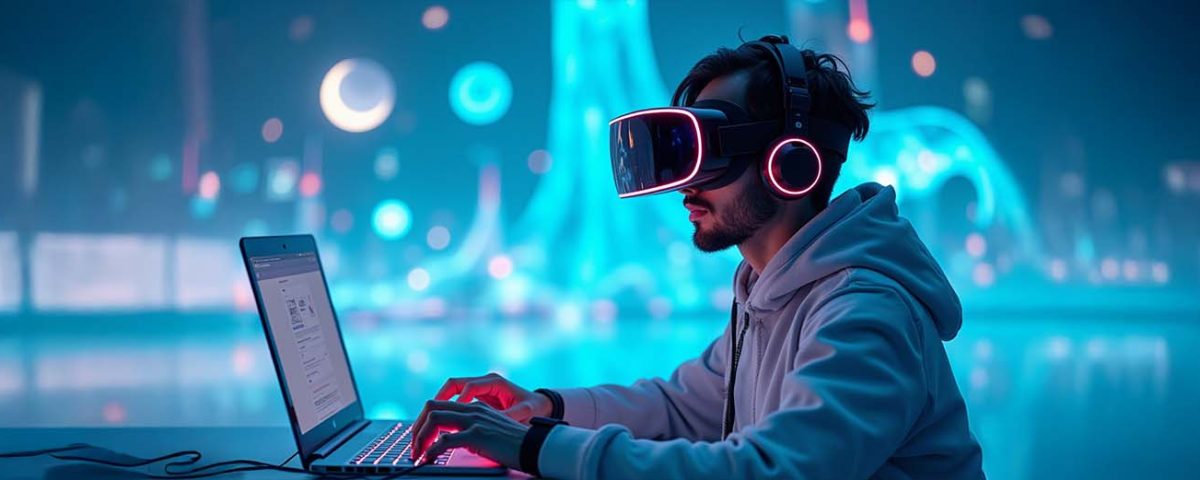
AI-Powered SEO & ASO: How to Dominate Search Engines and App Stores in 2025
March 19, 2025Introduction
The gaming industry is undergoing a revolution—and it’s not just about better graphics or faster consoles. By 2024, 80% of AAA game studios will use AI to build worlds so immersive, players lose track of time. Forget static NPCs and repetitive quests; AI is now crafting dynamic stories, self-learning enemies, and infinite universes tailored to your playstyle.
But how does it work?
From reducing development costs by 40% (Unity 2023 Report) to creating emotionally adaptive gameplay, this article breaks down how AI is transforming game development—and why your next favorite game might owe its soul to a machine.
Procedural Content Generation: Infinite Worlds, Zero Repetition
Subheading: “Why Build Manually When AI Can Do It at Light Speed?”
Procedural content generation (PCG) uses algorithms to automatically create game assets, from sprawling landscapes to intricate loot systems.
- Example 1: No Man’s Sky famously used PCG to generate 18 quintillion planets, each with unique ecosystems.
- Example 2: Indie roguelike Hades used AI to randomize dungeon layouts, ensuring no two runs feel the same.
- Tools:
- Unity ML-Agents: Lets developers train AI models to design levels.
- Promethean AI: Generates realistic 3D environments from text prompts (e.g., “post-apocalyptic city with overgrown vines”).
Why It Matters: PCG slashes development time, allowing small studios to compete with industry giants.
Want to build vast worlds on a budget? Explore our game dev services
Smarter NPCs: Enemies That Learn, Allies That Adapt
Subheading: “Dumb Bots Are Dead—Meet NPCs with a PhD in Annoying You”
Gone are the days of NPCs following pre-scripted paths. Machine learning now lets characters evolve based on player behavior:
- Dynamic Storytelling: AI Dungeon uses GPT-4 to generate endless story arcs based on player choices.
- Adaptive Combat: In Middle-earth: Shadow of Mordor, the Nemesis System creates villains that remember your tactics and counter them.
- Case Study: EA’s Battlefield 2042 uses AI to scale bot difficulty in real time, keeping matches challenging but fair.
Pro Tip: Pair AI with motion capture for NPCs that feel human (e.g., The Last of Us Part II).
AI-Powered Testing: Crushing Bugs Before They Crush You
Subheading: “Why Pay Testers When AI Works 24/7 for Coffee?”
Testing a game manually takes months. AI does it in days:
- Ubisoft’s Commit Assistant: This tool detects bugs by comparing new code to past errors, saving thousands of hours annually.
- AI Playtesters: Bots simulate millions of gameplay scenarios, uncovering exploits (e.g., speedrunning glitches in Elden Ring).
- Balancing Acts: AI analyzes player data to adjust difficulty spikes, drop rates, and economy systems.
Stat: Studios using AI testing report 60% fewer post-launch patches.
Launch flawless games—[Ask us about AI testing solutions
Personalized Gaming: Playstyles as Unique as Fingerprints
Subheading: “Your Console Knows You’re Crying—And Adjusts the Game”*
AI is making games as personal as your Spotify playlist:
- Emotion Recognition: Startups like Affectiva use webcams to read facial expressions, letting games adjust music, dialogue, or difficulty.
- Example: A horror game could ramp up scares if it senses you’re bored.
- Netflix for Games: Platforms like Xbox Game Pass use AI to recommend titles based on your play history.
- Biometric Feedback: VR games like Resident Evil 4 adjust tension based on heart rate data from wearables.
Future Trend: AI-generated voice acting that mimics your speech patterns for personalized dialogue.
Ethical Dilemmas: Will AI Steal Jobs—Or Supercharge Creativity?
Subheading: “The Dark Side of AI: Bias, Burnout, and Big Questions”
AI isn’t all rainbows:
- Job Disruption: Entry-level roles (e.g., QA testers, junior artists) are declining, but new jobs like AI Trainers and Ethics Auditors are rising.
- Bias in AI: Early tools generated stereotypical NPCs (e.g., overly aggressive female characters). Studios now audit datasets for diversity.
- Creative Burnout: Crunch culture worsens as studios expect faster output. The solution? Union-led AI ethics guidelines.
Quote: “AI is a tool, not a replacement. The best games will always need human soul.” – Hideo Kojima.
Conclusion
AI isn’t here to replace game developers—it’s here to turn their wildest ideas into reality. Whether it’s crafting infinite worlds, tailoring stories to your emotions, or squashing bugs before launch, machine learning is the ultimate co-developer. The future of gaming isn’t just about playing; it’s about experiencing worlds that live, learn, and adapt—with you at the center.
Ready to build the next-gen game? Partner with our AI-powered development team and turn your vision into a universe.
